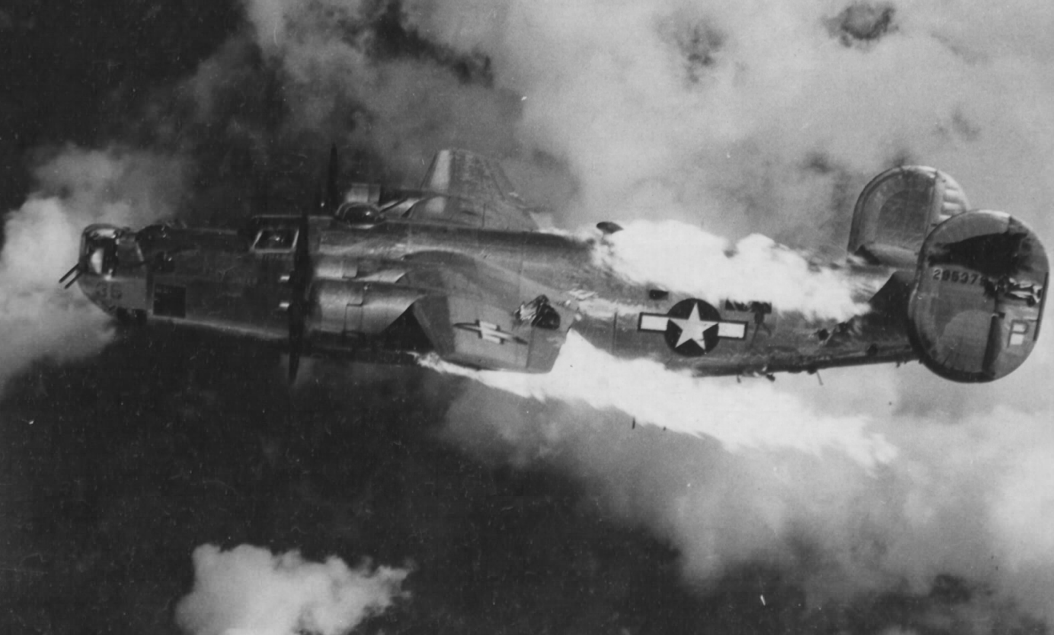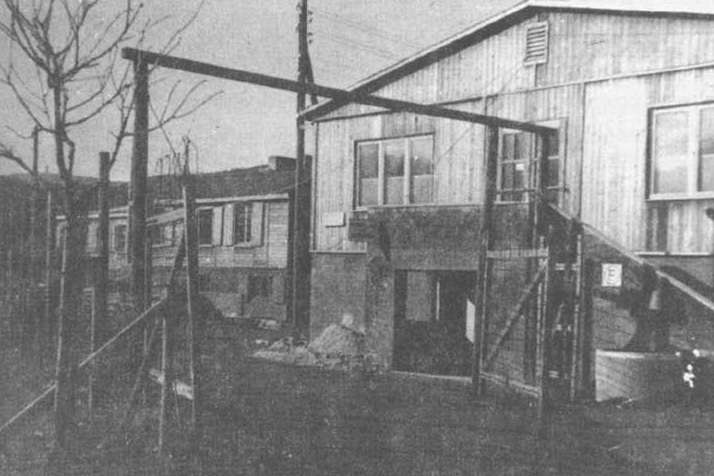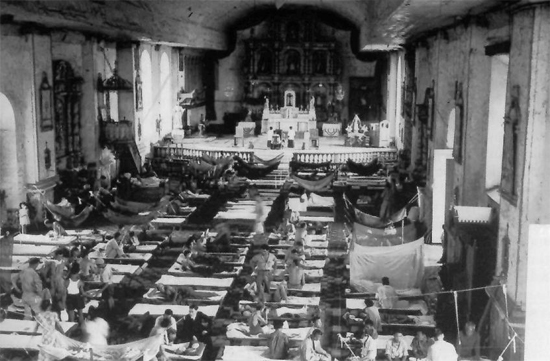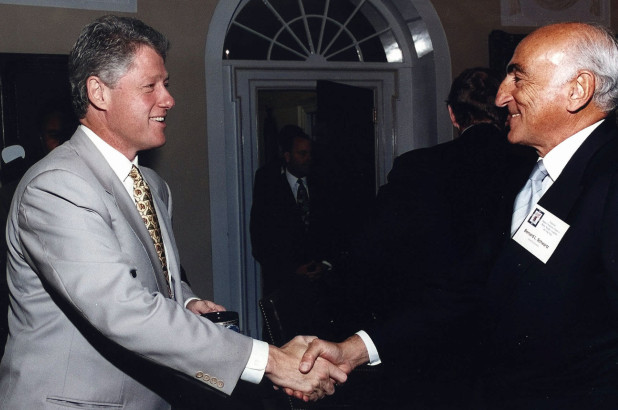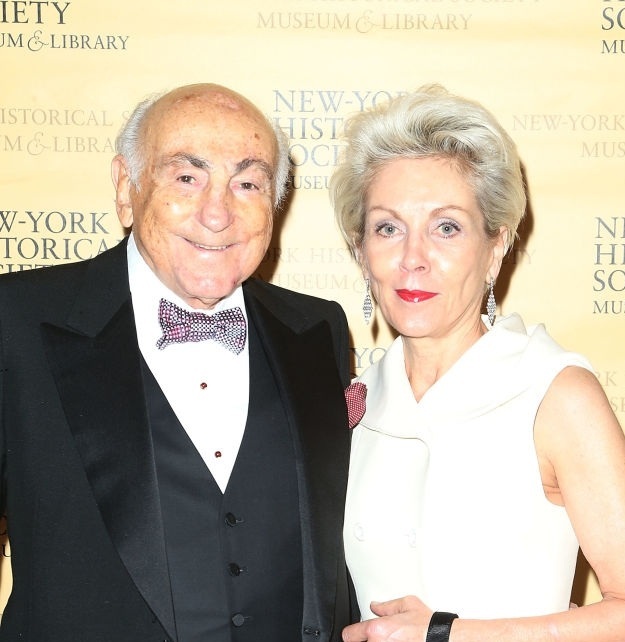My American Story: Bernard Schwartz
by Bernard Schwartz
The Schwartz Family came from Germany before the Civil War and settled in Memphis, Tennessee where they led a prosperous life in the retail industry. My grandmother was born around the 1860’s and lived in Memphis until she was married. My grandfather came to this country from Germany as a young man, settled in New York City, and became a member of Tammany Hall, Democratic Party’s organization that dominated New York City politics. My grandfather’s job was that of a middle grade political operative for the Party.
My grandparents had four children, three daughters and my father, all born and raised in New York. My father was born in 1888. My grandfather contracted pneumonia after being exposed to cold winter winds giving political speeches on NYC street corners. When he died, he left his wife and four children. My father left school and became the family breadwinner. He met my mother in New York City and they married around 1911.
My grandmother lived for many years after her husband’s death. Thereafter on each Thanksgiving and each Christmas, Tammany Hall sent her a turkey and a bag of coal. These were modest contributions to her financial requirement, but the family knew somebody there cared for them, and it made good Democrats of all of the following 5 generations. Turkeys and bags of coal are modest but the bonding that ensued was formidable.
My father started business as a signage manufacturer, and like many small businesses, some years he did very well and some years he did not. The years my father’s business did well, the family vacationed in the Catskills at great hotels. When business was not so good, we went to Coney Island.
My mother was born in Russia; her mother died during her childbirth. Her father (my grandfather) left Russia to avoid being drafted by the Russian Army and came to New York leaving my mother in the care of her grandmother in Russia. It took 8 years before my grandfather could arrange to bring his only daughter, my mother, to the United States. Her grandmother arranged to send my mother to New York by train and trans-Atlantic boat; and would never see her again. My mother was 8 years old, alone, not knowing any language other than Russian, and being met by her father whom she did not know. She went to schools in New York City and eventually became an attractive young lady that captured her husband in New York. My parents had three children, my two elder brothers and myself. We lived a happy and fulfilling life together; my parents died around 1960’s.
My brother Harold was a dashing good looking fella. In 1943, he enlisted in the Army Air Force and was assigned to a B24 bomber plane stationed in England to bomb Germany. In his 35th mission, his plane was shot down. Harold, seriously wounded in the leg, parachuted, to be captured by German troops. He was the only member of the 11-man crew that survived. He was sent to a German interrogation center, without receiving any medical attention or food. His only response to the interrogation was his name, rank and serial number. Upon realizing he was to be captured, he threw away his dog tags (as instructed by his army so as not to disclose he was Jewish).
He was then sent to a German hospital where there was only one other American soldier. Why and how this piece of luck occurred, nobody knows.
He received excellent medical attention (a German doctor saved his leg and even gave him dental attention) but not well fed. But, the hospital received many care packages of food and cigarettes and candy. Since there were only 2 Americans, they received all the packages and my brother withdrew the cigarettes he found in the packages and played pinochle with 3 German patients who only played with Harold because he lost intentionally and gave them the cigarettes. He was liberated by Patton’s army just prior to the end of the war.
On his release, Harold received $750 of mustering-out pay, met another soldier who had also received $750 as mustering-out pay and they decided to go into business with the $1,500. The business that they built was called APL Corporation and it became a Fortune 500 company. It was very well known and very successful.
Our older brother, Jules, was married with a young daughter at the beginning of the war and worked at General Electric Corporation in Bridgeport, CT. He received, because of age, marriage and secretive military work at General Electric a deferment during the war. He eventually became a successful stock broker on Wall Street.
I was born in Brooklyn, New York. We were a very close family, often did business together, always available for each other’s needs.
“I am optimistic about America’s future. History shows that the people of this country have risen to every challenge - economic, political, cultural and moral. ”
I went to a 3-year special high school (Townsend Harris) and eventually City College. Before graduation during World War II, I enlisted in the Army air corps and was a pilot cadet until my discharge in 1945. After graduation I became a successful business man and became President of Reliance Insurance Company. In 1972, I bought 12% of Loral Corporation and became its Chairman and CEO. At that time Loral’s sales were about $27 million and losing money. After assuming control of Loral, the company turned in 96 uninterrupted consecutive quarters of increased earnings over the prior year. We became a Fortune 200 company with a public market value of about $15 billion. In the year 2004, I retired from Loral and am happy to say that each of our operating divisions continued to do well.
I am a Democrat; I have two lovely daughters and four grandchildren, all Democrats. I married my wife in 1950 and we remained married for 63 years. She was an awesome partner and died in 2014. I have been lucky enough to marry a Cleveland girl named Denise and as I explained to my children, Denise is not replacing Irene, their mother; she has added herself to the family.
I am optimistic about America’s future. History shows that the people of this country have risen to every challenge - economic, political, cultural and moral. We as a nation will experience periods of discontent, of poor political behavior, and sometimes an inefficient political system but history shows that we eventually succeed and so we will during the current circumstances.
I believe in the Democrat Party’s attitude seeking equality and advancement for our middle class and our poor. I believe in a graduated income tax in which poor people pay a lesser amount of income tax than rich people. I believe in estate taxes. I believe in the Obama Health Care plan. I believe in closing the loopholes in our tax code that benefit the rich.
As a good capitalist I do not believe in taking from rich people to give to their less endowed classes, but we must allow the middle class and the poor greater opportunities for income growth.
But I believe in a two-party system. I respect the Republican Party, even though I don’t agree with most of it. The stronger the Republican Party, so will the Democratic Party be strong. That is good for America.
Life has been good to the Schwartz family. I attribute a great part of it to luck, and to the America that is great and will become greater.
About The Author
Bernard L. Schwartz is a private investor, a progressive public policy advocate, a philanthropist and a retired industrialist. He is currently chairman and CEO of BLS Investments, LLC, a private investment firm founded in 2006. In addition to his personal portfolio, Mr. Schwartz manages the Bernard and Irene Schwartz Foundation which focuses on four major areas of support: think tanks and economic policy advocacy organizations that develop strategies to promote U.S. economic growth and job creation initiatives; educational institutions; medical research centers; and, major New York City-based cultural organizations.
He is often called upon to express his views or provide counsel on matters ranging from U.S. economic growth and competitiveness to job creation, investment in infrastructure, innovation, technology, and research and development. At a number of institutions, he has initiated programs that rigorously examine current U.S. economic policy and competitiveness, and that consistently challenge current orthodoxy to arrive at policy proposals that will further U.S. economic and technological preeminence and will create jobs. The policy proposals that emerge from these programs are broadly distributed to members of the administration and Congress, educators, researchers, the media and the general public.



